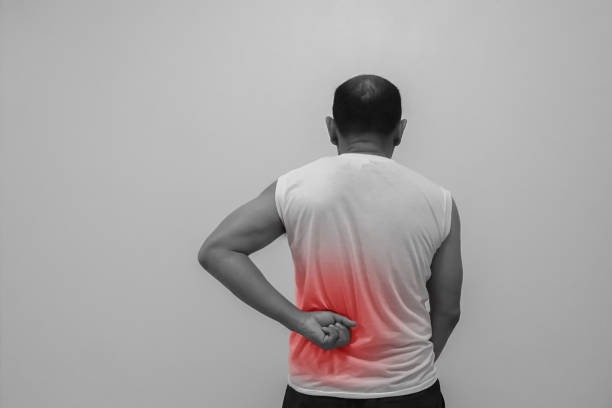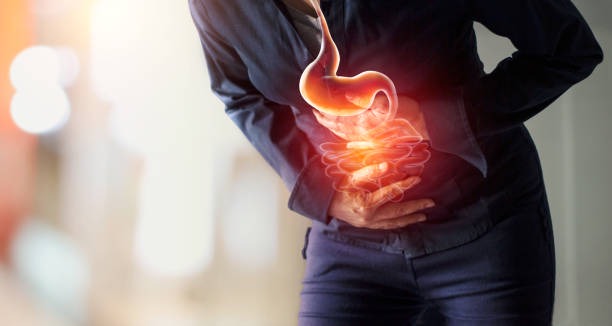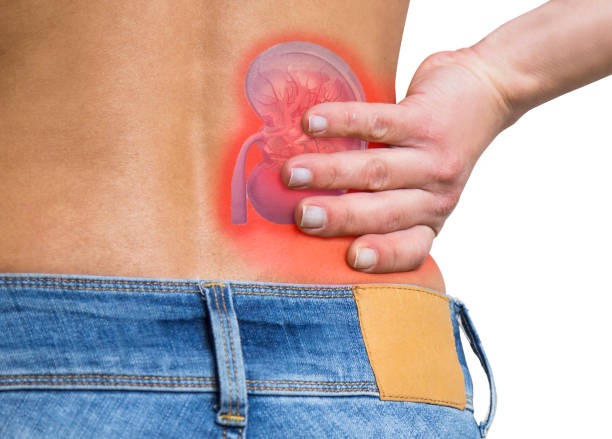Causes of Left-Side Abdominal Pain Near the Waist and How to Relieve It
[ad_1]

According to WebMD – The left lower abdomen is where important organs, such as the left kidney, left ureter, colon, and bladder, gather. In women, the area is also home to the left fallopian tube and ovaries. Therefore, the condition of left abdominal pain near the waist should not be underestimated.
So that it can be treated properly, consider the various causes of lower left abdominal pain and waist and how to overcome them.
9 causes of left-sided abdominal pain near the waist and how to deal with it
From diverticulitis to ectopic pregnancy, here are the various reasons why the left side of your stomach hurts all the way to your waist.
1. Diverticulitis

Diverticulitis is one of the causes of left-sided abdominal pain to the waist that needs to be watched out for.
This medical condition occurs when the diverticula become torn, swollen and infected. Diverticula are small pouches that form due to pressure on weak points in the colon.
Diverticulitis is considered quite common, especially in people aged 50 years and above.
Apart from abdominal pain, here are other possible symptoms of diverticulitis.
Fever
Nausea
Vomiting
Abdominal pain when pressed.
In rare cases, constipation and diarrhoea can also signal diverticulitis.
For mild diverticulitis, the doctor may advise the sufferer to rest, change their diet, and take antibiotics.
If the condition is severe and keeps recurring, surgical procedures may be required.
2. Gassy stomach and belching
The presence of excess gas in the digestive system can also be the reason why the lower abdomen hurts.
Gas can actually be found in the digestive system, for example in the stomach and rectum.
However, some of the following conditions can also trigger gas build-up.
Swallowing more air than usual
Overeating
Smoking
Chewing gum
Not being able to fully digest certain foods
Eating foods that produce gas
Having a bacterial disorder in the colon.
As a solution, here are a number of ways to deal with lower left abdominal and lumbar pain caused by excess gas.
Move your body, such as walking
Gently massaging the painful part of the abdomen
Practising certain yoga movements.
3. Ulcer

Ulcers usually occur after eating. This is because the stomach produces acid while consuming food. This acid can irritate the oesophagus, stomach and intestines.
The pain caused by ulcers generally appears in the upper abdomen. However, in some cases, the pain can occur in the lower abdomen.
Here is a remedy for left-sided stomach pain near the waist caused by ulcers.
Proton pump inhibitors and H2 antagonists (to reduce stomach acid)
Prokinetics (can be taken when gastric emptying is slow)
Antibiotics (if caused by pylori bacteria infection).
4. Hernia
A hernia is a condition that occurs when an organ or fatty tissue pushes against a weak spot in the surrounding muscle or connective tissue called fascia.
This condition can result in abdominal pain on the left side near the waist.
Hernias can be treated through open or laparoscopic surgery. In this procedure, the surgeon will make an incision near the hernia site and then push the protruding tissue back towards the abdomen.
The incision is then sutured closed. Sometimes, these stitches may be reinforced with surgical mesh.
5. Kidney stones

Most cases of kidney stones arise from a build-up of minerals that can form in either the left or right kidney.
In some cases, sufferers are not aware of the presence of kidney stones until the mineral build-up causes problems, such as blocking part of the kidney or causing severe pain.
In addition, here are some of the symptoms that can accompany kidney stones.
Abdominal pain
Pain when urinating
Nausea and vomiting
Bloody urine
Fever and chills
Severe pain on one side of the lower back.
For left-sided abdominal pain that extends to the waist due to kidney stones to be resolved, your doctor may ask you to drink plenty of water to remove the stones without surgery.
In addition, medication may also be advised to reduce the acidity of the urine.
However, if the size of the kidney stone is too large, blocks the flow of urine, or there are signs of infection, the doctor may recommend a surgical procedure.
6. Celiac Disease
Celiac disease is a chronic condition that occurs in the digestive system when a person cannot digest gluten.
Gluten is a protein found in wheat and contained in some foods and health products.
When a person suffers from this condition, the consumption of gluten can trigger the immune system to attack parts of the intestines and result in several digestive problems.
If left untreated, this problem can cause long-term damage to the small intestine.
Not limited to abdominal pain, Celiac disease can cause pressure and gas, flatulence, fatigue, weight loss, and diarrhoea.
In order to relieve the symptoms, people with Celiac disease need to avoid various foods that contain gluten.
7. Lactose intolerance

A person suffering from lactose intolerance may have difficulty digesting milk and dairy products, such as cheese or yoghurt.
This problem occurs due to insufficient levels of an enzyme called lactase in the body.
Lactase is an enzyme that breaks down lactose, which is made up of glucose and galactose.
Lactose intolerance makes the body unable to digest lactose from food and drink.
When this undigested lactose enters the colon, bacteria break it down and cause gas and fluid.
The increase in gas and fluid can lead to the following symptoms that can be bothersome to sufferers.
Abdominal pain
Diarrhoea and loose stools
Bloating
Excess gas
Nausea.
This condition can be alleviated by taking lactase tablets before eating or drinking dairy products.
In addition, lactase is available in liquid form that can be dripped into milk before drinking by people with lactose intolerance.
8. Constipation
Constipation occurs when a person is unable to pass stool, has hard stools, or passes stool less than three times a week.
This problem can arise due to lack of exercise, lack of fibre or fluids, certain medications, and irritable bowel syndrome (IBS).
In addition, here are some of the symptoms that may accompany lower left abdominal and lumbar pain.
Straining or pain during defecation
Hard and dry stools
Defecation less than 3 times a week
Abdominal bloating or discomfort.
Constipation can be managed by improving your diet, exercising regularly and drinking more fluids.
9. Ectopic pregnancy

One of the causes of lower left abdominal and lumbar pain in women is ectopic pregnancy.
This condition is characterised by the growth of a fertilised egg outside the uterus, such as in the fallopian tube.
As the pregnancy progresses, the fallopian tube may rupture and threaten the life of the sufferer.
Here are the symptoms of an ectopic pregnancy to look out for.
Mild pain or cramping in the abdomen or pelvis
Lower back pain
Abnormal vaginal bleeding.
The above set of symptoms can progress to severe abdominal and pelvic pain, shoulder pain, and dizziness.
An ectopic pregnancy is an emergency and needs to be treated at the hospital as soon as possible.
Early ectopic pregnancy without unstable bleeding can be treated with methotrexate by injection. The aim is to stop cell growth and dissolve existing cells.
However, the doctor needs to confirm the diagnosis of ectopic pregnancy first.
After that, the doctor may perform a human chorionic gonadotropin (HCG) test to determine if the treatment is working or if more medication is needed.
When should I see a doctor?
The condition of left-sided abdominal pain near the waist should not be underestimated, especially if it occurs continuously or the pain is severe.
In addition, you should also visit your doctor immediately if any of the following symptoms appear.
Bloody faeces;
Persistent diarrhoea, constipation and changes in bowel movements;
Weight loss with no known cause.
To find out more about the causes of left-sided abdominal pain near the waist, ask your doctor directly.
Content created and supplied by: Trendyhealth (via Opera
News )
Opera News is a free to use platform and the views and opinions expressed herein are solely those of the author and do not represent, reflect or express the views of Opera News. Any/all written content and images displayed are provided by the blogger/author, appear herein as submitted by the blogger/author and are unedited by Opera News. Opera News does not consent to nor does it condone the posting of any content that violates the rights (including the copyrights) of any third party, nor content that may malign, inter alia, any religion, ethnic group, organization, gender, company, or individual. Opera News furthermore does not condone the use of our platform for the purposes encouraging/endorsing hate speech, violation of human rights and/or utterances of a defamatory nature. If the content contained herein violates any of your rights, including those of copyright, and/or violates any the above mentioned factors, you are requested to immediately notify us using via the following email address operanews-external(at)opera.com and/or report the article using the available reporting functionality built into our Platform
See More
[ad_2]

